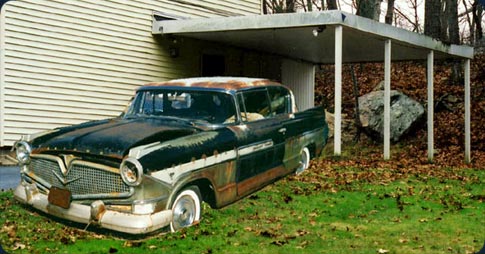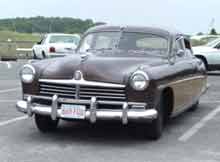My neighbor Dale Treadway snapped this
Hudson while vacationing at Cape Cod last summer. It’s a 1948 or
’49 Commodore – only the interiors differed between those two years. He
spotted it in the parking lot at Rock Harbor in Orleans, and noted that it carries a
regular passenger registration, a number issued in November of 2001. That implies that it’s in everyday use, not a collector car.
It could be what I call a “summer car.” When I was young I spent many summers at The Cape, and it was common to see older cars, often touring cars or
woodie wagons, on the road. Massachusetts allowed six-month renewals for registration and insurance, so many folk kept a car at their summer cottage for use from July until Labor Day. Friends of ours on Nantucket had a
1930 Lincoln “summer car” in the 1950s and it may still be on the island. In eastern Massachusetts the woodies were called
“beach wagons” for obvious reasons.
Alternatively, it could be in regular use by somebody who simply prefers old cars. For six years we drove a 1963 Ford Falcon as our family car, and it was replaced by a
1970 Chevy Impala that was so roomy and useful we found we didn’t need a minivan. These cars were 16 to 21 years old when we had them, nowhere near automotive senility. In fact, a 56-year-old Hudson is entirely satisfactory for everday use.
In 1948, Hudson introduced its new “Step-down” design, so named because the floor was level with the bottom of the outer frame rail. Thus one stepped down to get into it. Overbuilt by today’s standards, the Step-down had a
steel cage that completely surrounded the passenger compartment. A high belt line gave the “greenhouse”
small windows, unusual at the time but now coming into vogue with the
Chrysler C300. Hudson also had a
new six-cylinder engine for 1948, with full pressure lubrication for the first time in any Hudson.
In 1951, Hudson introduced the
Hornet, a new top-of-the-line model with an enlarged six. It not only had plenty of
luggage space, with the new optional
“Twin H-Power” dual carburetion it had plenty of power.
Marshall Teague, Herb Thomas and
Tim Flock were among the Hudson drivers to knock
Oldsmobile out of the NASCAR championship in 1951 and retain the title through 1954. With the new 308 cubic inch Hornet engine setting records, the old eight, a
pre-war design with
splash oiling, was redundant and was dropped after 1952.
Hudson’s 1954 marriage with Nash to form
American Motors resulted in
1955 models that were more Nash than Hudson. In fact, the best-selling Hudson in ’55 was a rebadged
Rambler Cross Country wagon. The
1954 cars were the last Step-downs and, to many, the last real Hudsons. The final automobile to wear a Hudson badge was the
1957 Hornet, a car
familiar to all CarPort regulars.

